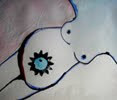So, I've been facing a few fears lately...
One being that I went to search out this book who's title so haunted me the first time I saw it.
Not of Women Born
Representations of Cesarean Birth in Medieval and Renaissance Culture
by Renate Blumenfeld-Kosinski
Well I've read it through now, it's a true academic read, made me put to use my high school Latin and wade through 40 pages of footnotes! -It's also totally fascinating.
It documents the time in the history of western civilization when cesarean births entered medical texts. A time when women healers and midwives were forced from the birthing room and their male counter parts took over with scalpels and forceps at the ready.
There is so much information in this book I'm going to have to divide it up into a few post topics to do it any justice.
I thought I would start by summing up the ancient history of cesareans that Blumenfeld-Kosinski includes:
2000BC Mesopotamian Cuneiform tablet references a child "pulled from the womb" and then adopted.
715BC the "lex regia" proclaimed by Roman king Numa Pompilius decreeing it unlawful to bury a undelivered women. Anyone doing this would be guilty of causing the death of the child.
3rd Century BC -3rd Century AD Two Ancient Jewish Texts reference Cesarean births:
Mishna text includes reference that twins brought forth by cut in the abdomen must share right of succession.
Nidda appendix to Talmud refers to women who bring forth children by cut in their abdomen not needing to observe the traditional days of purification, This text is
particularly interesting as it suggests that the mother has survived.
5th Century BC- 2nd Century AD an Indian doctor named Susruta writes medical text
Nidanasthana includes urgings for doctors to preform an abdominal delivery quickly in
the event of the death of the mother.
23-79 AD Roman Scholar
Pliny the Elder discusses the auspiciousness of a cesarean birth. The idea that the person
cheated death at birth.
These ancient references brought the context of the modern cesarean to a new place for me. These seeds in history, these ancient mothers, most who did not survive the births of their children, I feel the need to honour their sacrifice. While the risk of death during cesarean birth is still much higher then vaginal birth, I am so grateful for these thousands of years of learning that helped keep me and my baby safe.
Subscribe to:
Post Comments (Atom)





Wow--Sounds like a fascinating book.
ReplyDelete